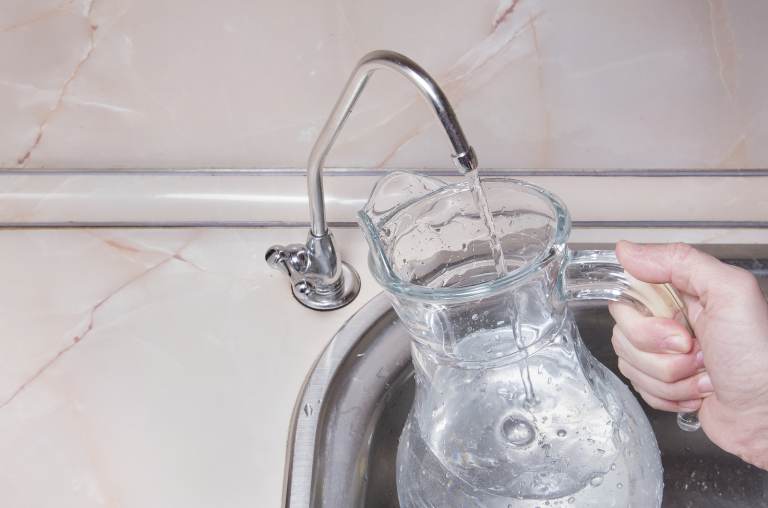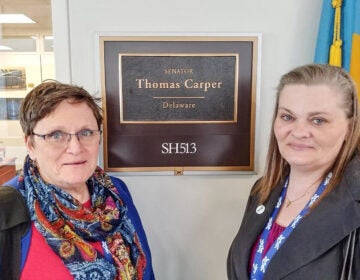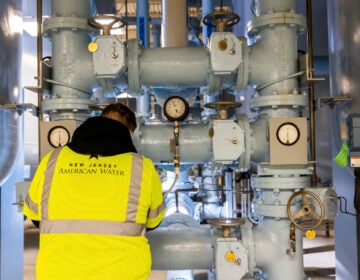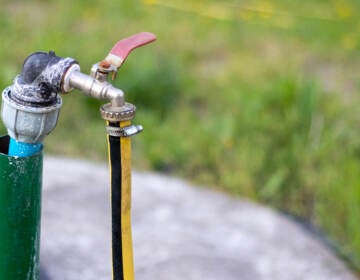New Pennsylvania funding will connect more homes with PFAS-tainted wells to public water
More than $15.8 million in PFAS remediation grants were awarded to local municipalities and water authorities in Bucks and Montgomery counties.

File photo: A number of projects are underway to remove PFAS, or 'forever chemicals', from the water in Montgomery County. (marina-tr/BigStock)
A new round of state funding will help additional residents of the area around the former Willow Grove Naval Air Station-Joint Reserve Base who have PFAS-contaminated private wells connect to clean public water.
State Rep. Todd Stephens and members of the Military Installation Remediation and Infrastructure Authority announced Friday more than $15.8 million in remediation grants for local municipalities and water authorities.
It’s the second time the grants have been offered. In 2019, Stephens authored legislation to create a dedicated recurring funding stream for PFAS remediation and economic redevelopment activities surrounding the now-decommissioned air base in Montgomery County.
The Pennsylvania funding has been used by the water providers to refund surcharges that local residents have been paying to remove PFAS from their drinking water. It also pays for the continued remediation efforts necessary to achieve a non-detectable standard of PFAS, as well as connecting those with contaminated wells to a public water system.
“Folks are so thankful to have their hard-earned funds returned to them after spending money for years through increased water bills, and having those surcharges returned to them is terrific,” Stephens said. “But even more heartwarming, frankly, and rewarding has been the response from those who were dealing with PFAS contamination in a private well, and they were unable to connect to the clean public water until now. And those folks have just been so thankful for the opportunity to get connected and ensure that their families are drinking water that has no detectable levels of PFAS.”
For decades, the toxic class of chemicals has contaminated groundwater, air, and soil in communities in this region and across the country, as well as waterways and the fish living in them. These so-called “forever” chemicals — PFAS stands for per- and polyfluoroalkyl substances — are widely used in consumer products such as nonstick cookware, flame-retardant fabrics, and some food packaging.
PFAS are also found in firefighting foam used at airports and current and decommissioned military bases, such as those in Bucks and Montgomery counties, at Joint Base McGuire-Dix-Lakehurst in New Jersey, and Dover Air Base in Delaware. The numerous health problems, including some cancers, linked to PFAS have led to lawsuits against the companies that make the products, such as DuPont and its successor companies, and 3M.
The water supply surrounding the former Willow Grove Naval Station was found to have PFAS levels above the Environmental Protection Agency’s limit of 70 parts per trillion. Water companies were able to filter out the contamination, but private well owners were left to fend for themselves.
Stephens said that without the funding, these large-scale projects would place a significant financial burden on residents.
“We’ve paid for the capital costs for the installation of carbon filters. Those filters are about a million dollars apiece, and then those filters have ongoing maintenance costs of several hundred thousand dollars to change out the carbon or the resin. So those costs are no longer being borne by the ratepayers,” Stephens said.
“Additionally, as it relates to connecting private well-owners, many of these folks live in areas where there’s not a water main in front of their home. And that’s a significant cost, for the water provider to run a water main down those streets. And then it’s a significant, even greater cost for the homeowner to run the service line from the home out to the street. And while the water provider typically pays for the water main, the homeowner is typically paying for that service line, which is typically thousands of dollars as well,” he added. “So the ratepayers in each of the areas that we have funded are benefiting tremendously from our program. And that’s the goal.”
One of the grant recipients, the Warminster Municipal Authority, is receiving more than $5.4 million to continue its work connecting private well owners to PFAS-free public water. If there’s money left over, the authority will rebate customers who have been paying higher charges to purchase a supplemental PFAS-free water supply.
Each house being connected to public water — around 200 of them — costs around $20,000 on average, said Tim Hagey, general manager of the Warminster Municipal Authority.
“Some of those customers didn’t have a water main in front of their house. So we had to run a water main, dig up the road, install a water main and then install individual services from the water main into the house, then abandon the existing well. So all those things are very costly, and then to repave the road,” he said. “We just let a contract out for a water main on a very small cul-de-sac road — it was the last road in the township without a water main — and it ends up being about $300 a foot. So if it’s a 2,000-foot cul-de-sac road, that adds up very quickly.”
Hagey said not only does the funding help customers financially, but it means they will no longer have to worry about contaminated water.
“The biggest issue is that they have access to PFAS-free water. They don’t have to worry about what they’re ingesting, what their families are ingesting. So from a health standpoint, it’s the primary benefit,” he said.
The grant recipients
Ambler Borough was awarded more than $1.1 million to fund design, permitting, and construction of a treatment system at two of its wells serving residents in Lower Gwynedd affected by PFAS. Funds were also requested for carbon change-out and quarterly sampling.
The Horsham Water & Sewer Authority was awarded more than $3.3 million to help fund PFAS systems operation and maintenance costs, water main extensions, and house connections for PFAS-affected private wells, tapping, and meter fees costs, and for capital equipment and systems.
The North Wales Water Authority was awarded more than $1.9 million to fund a new service water line to permit connections to about 80 homes and businesses within Warrington Township, whose wells have been negatively affected. The balance of funds will be available for the continued support of construction and other PFAS-related eligible costs for a new 4.1 million-gallon water tower on General Hancock Boulevard in North Wales.
The Warminster Municipal Authority was awarded more than $5.4 million to fund the reimbursement of the Valley & Kingsley Pipe installation and connection project, County Line Road water mains, public water connection for PFAS-affected homes in Hartsville, and public water connections for PFAS-affected homes in Warminster, and to reimburse customers for additional water costs from 2016 to 2020.
The Upper Southampton Municipal Authority was awarded $586,591.74 in support of providing water service along Laurel Road and Clover Circle by building an extension off the existing water main from Fern Road. Thirty-one residents along these roads currently have private wells with PFAS contamination attributable to the former Naval Air Development Center-Johnsville base.
Horsham Township was awarded more than $1.8 million in support of its intersection improvement project at Limekiln Pike and Horsham Road. Horsham Road, a major commuter corridor to the township’s five business parks, will provide direct access to the former Willow Grove air station property and is considered critical to the success of its redevelopment.

Saturdays just got more interesting.
WHYY is your source for fact-based, in-depth journalism and information. As a nonprofit organization, we rely on financial support from readers like you. Please give today.







